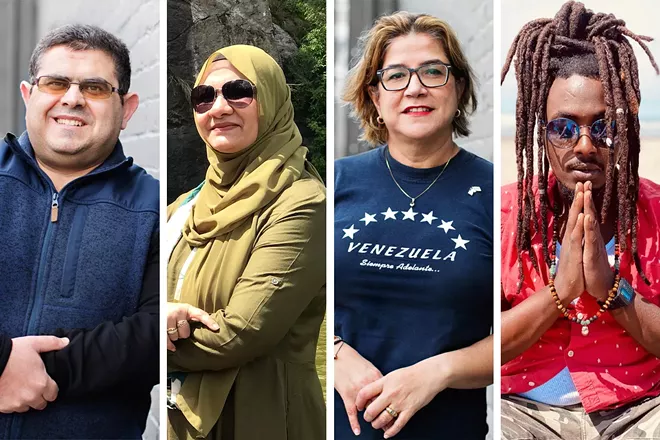The idea is so brilliant, you wonder why others haven't done the same thing: Find people passionate about cooking and help them hone their skills while also offering a unique dining experience.
That's Feast World Kitchen (1321 W. 3rd Ave.), which debuted fall 2019 with a handful of would-be chefs and an ambitious plan: create community through shared culture and food from Spokane's international communities, including its diverse immigrant and former refugee populations.
Feast's chef list has since expanded to 50 members and is still growing. The nonprofit recently also added walk-up patio dining and catering to its original online takeout process. Meet four of Feast's enterprising chefs, who arrived in Spokane by way of Syria, Pakistan, Venezuela and Rwanda.
ABDULKAREEM MAHMOUD, Syria
Like his father before him, Abdulkareem Mahmoud loves to cook and, also like his father, has watched his own son's love of cooking blossom into a new career.The father of three came to Spokane in 2015 from Daraa, in southwestern Syria, where he once had his own restaurant. It's a dream he hopes to resurrect soon and plans to name Shiblak, his family name.
One of Feast's foundational chefs who joined in 2020, Mahmoud has gone from cooking once a month to twice a month, as well as catering, with his recipe for shawarma appearing as a frequent special.
Common to many Arabic-speaking peoples, shawarma is meat — lamb, typically, but also beef, chicken and other meats — slowly grilled on a spit, then shaved off in thin slices and served with such sides as bread or salad. Lamb figures prominently in two other dishes that represent his culture, says Mahmoud: mansaf and ouzi (also spelled quzi and qoozi).
Feast chef and director of the nonprofit's chef program Maisa Abudyha smiles as she translates Mahmoud's favorite dishes.
"Those are Jordanian, too," she says, noting her own country of origin, and adding that many dishes reflect several cultures.
ZUBIA ROOHI, Pakistan
There is some crossover between cultures in Zubia Roohi's cooking as well. Roohi hails from the province of Karachi, Pakistan, which has a long and complex historical relationship with India, its southeast neighbor.Thus, Roohi creates many dishes which are also common in Indian cuisine like korma, tikka, roti and meals made in the tandoori oven. The distinction, Roohi says, is that Pakistani food is much more likely to contain meat, so it has more savory notes, as well as stronger, deeper spice profiles.
Roohi started cooking at a young age and has spent nearly 25 years perfecting recipes and trying new dishes. If she had to choose a signature Pakistani dish, it would be biryani, a long-grain rice dish with meat that she often features at Feast.
When she visits home, however, she always asks for halwa puri, fried flatbread and halwa, which is a type of pudding. When she makes it for Feast diners, she serves sweet halwa, made with semolina flour, sugar, nuts and raisins, alongside chana, or chickpeas with tomatoes and spices.
PATRICIA CASTANEDA, Venezuela
Patricia Castaneda's signature dish is the Venezuelan version of cornmeal cake, called arepa.The unleavened bread is made with cornmeal that's been cooked, then dehydrated and used like flour. The little grilled cakes can be stuffed with goodies, like cheese or black beans, or piled high with toppings.
A native of Margarita Island, Venezuela, Castaneda was formerly a travel agent and can attest to the beauty of her country's landscapes, as well as its diversity of culinary influences.
"We're more about spices than spiciness," she says of Venezuelan food, which has been influenced by Spain and other European countries, as well as West Africa and indigenous cultures.
Since moving to Spokane in August 2019, Castaneda joined World Relief as a community outreach associate and has cooked at Feast about 10 times so far.
"The beauty about Feast World Kitchen is that I'll cook here something I would feed my family," says Castaneda.
OMY KARORERO, Rwanda
Family is often on Omy Karorero's mind when he cooks. Although he's partial to curried dishes and a corn-based, doughy dumpling called fufu, other dishes remind him of home and family long gone.A Rwandan dish of slow-cooked cassava leaves called sombe, for example, always reminds Karorero of his mother. He learned a bit about cooking by watching her as a young boy, at least until a particularly horrific time in 1994 during the Rwandan Civil War known as the genocide.
After finding himself alone and on the streets as a teenager, Karorero turned to music for solace. He also envisioned helping others through music, forming the basis of a nonprofit he created after emigrating to Spokane.
Initially, his nonprofit called Impanda focused on at-risk youth in Rwanda. Now Impanda is taking on a new mission to help at-risk youth in Karorero's adopted community. Impanda Studios is in the works as a music studio and gathering place in East Central Spokane to "transform pain into purpose."
Cooking also brings him a sense of purpose and healing, he says.
"You eat to feel," says Karorero, indicating that when you eat with your hands, you are literally connected to your food, much like walking barefoot on the earth.
"The only thing that can connect us all is music, art and food." ♦

